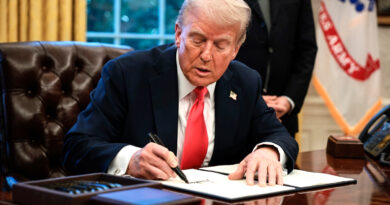Appeals Court Permits Trump to Dismiss Federal Watchdog
The removal of Hampton Dellinger by President Donald Trump was previously blocked by a lower court.
On March 5, an appeals court determined that President Donald Trump has the authority to dismiss the head of a federal agency tasked with investigating complaints from federal employees.
A panel from the U.S. Court of Appeals for the District of Columbia Circuit overturned a federal judge’s ruling that had stopped Trump from terminating Hampton Dellinger, the head of the Office of Special Counsel (OSC).
They also noted, “An opinion will be issued in due time.”
The appeal was handled by U.S. Circuit Judges Karen LeCraft Henderson, Patricia A. Millett, and Justin R. Walker.
This order means that Dellinger’s firing will proceed as the legal case continues.
Neither the White House nor Dellinger’s attorney responded to inquiries for comments.
The OSC is a federal agency responsible for investigating and prosecuting complaints made by federal employees, including whistleblowers.
On February 7, a White House official informed Dellinger of his termination, stating he was doing so on behalf of President Donald Trump.
According to federal law, the head of the OSC can only be removed for “inefficiency, neglect of duty, or malfeasance in office,” as noted in the lawsuit.
A federal judge reinstated Dellinger on February 10, the same day the lawsuit was filed, and he has maintained his position since then.
“Removing the restrictions on the plaintiff’s termination would undermine the core characteristic of the Office of Special Counsel as established by Congress and signed into law by the President: its independence,” she commented.
Government lawyers contended that by the power granted through Article II of the U.S. Constitution—which courts have interpreted to generally permit the removal of executive officials at will—Trump’s dismissal of Dellinger was legal and should not have faced a block.
The OSC’s independence “does not infringe upon any Article II powers or unconstitutionally divert substantial presidential authorities, because the Special Counsel can at most ‘shine… a light on wrongdoing,’ after which ‘it is up to the administration to choose to act on it,’” they stated, referencing earlier judgements.
One concern raised by the government was that the OSC, in its petitions to pause the terminations of employees, claimed the board must approve the request unless it deemed the petitions “inherently unreasonable.” In granting the stays, board members indicated their obligation to defer to the special counsel.
“While OSC’s request for an initial stay pending consideration of its filing is granted deference… that deference does not extend later in the process,” wrote Dellinger’s attorneys, asserting that the board maintains the sole authority to make decisions concerning the petitions.




